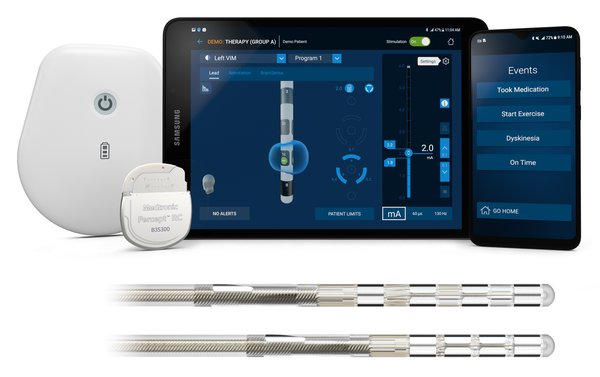A wirelessly rechargeable version of Medtronic’s Percept™ device with BrainSense™ technology† was recently approved by the Food and Drug Administration (FDA). Percept™ RC neurostimulator can help control tremors in patients with neurological disorders like Parkinson’s disease and treat the frequency of epileptic seizures.
Penn Medicine’s own world-renowned neurosurgeon, Dr. Casey Halpern, was the first in the U.S. to implant the device in a patient, marking the beginning of this new rechargeable technology being available to Philadelphians.
The device — called Percept™ RC neurostimulator— is the latest advancement in deep brain stimulation (DBS) technology from Medtronic, a global leader in healthcare technology that has pioneered the DBS field since 1987. As with Percept™ PC, the device is approved to treat Parkinson’s disease and other neurological movement disorders, as well as epilepsy.
How Percept™ RC neurostimulator works
What makes the Medtronic Percept™ RC device different?
• Sensing Technology
The Percept™ RC device is the only rechargeable neurostimulator that includes sensing technology to record and track signals from the brain – meaning clinicians will receive information back from the device, allowing them to personalize their patients’ care and tailor it to their evolving needs.
“It can be very cumbersome to figure out which stimulation strategy to take and which contact to use,” said Dr. Halpern, Penn Medicine’s division head of functional and stereotactic neurosurgery.
Percept™ RC’s BrainSense technology, offers a suite of tools. This means you’ll have decision-making support to select and optimize programming configurations and therapeutic results over time.
"In my practice the patient experience is very positive because the programming periods take less time,” said Dr. Halpern. “And while more data are needed, the sensing capability of this unique deep brain stimulation system allows me the potential to tune stimulation delivery to brain activity, which may be a way to personalize this therapy for Parkinson's disease in the future.”
Another advantage of the Percept™ RC device is that it’s the smallest rechargeable dual channel DBS neurostimulator‡ on the market,” said Amaza Reitmeier, vice president and general manager, Medtronic Brain Modulation. It has a very thin profile, and is designed for comfort.”
• Battery longevity
Patients can also easily recharge Percept™ RC while in the comfort of their home relaxing. They do this by putting a drape-like charging device that rests on the shoulders and is positioned over the neurostimulator.
“The Percept™ RC battery offers at least 15 years of service life with consistent stimulation and fast recharge performance§,” said Reitmeier. That means patients shouldn’t have to replace it for at least 15 years.”
The device can go from a 10 percent to a 90 percent charge in less than one hour§, so patients can recharge it once a week, although individual charging times may vary. If they want to keep it close to fully charged all the time, they can do that in as little as 10-15 minutes per day.
- Nearly 70 percent of DBS therapy-eligible patients with movement disorders may need an MRI within 10 years of receiving their device. (*1)
- Patients undergoing MRIs need to lie as still as possible, which can be very hard if your DBS stimulation cannot remain on.
• Wireless software updates and device versatility
Another feature of Percept™ devices that enables patients to keep them for many years is that the software can be updated without the need for a neurostimulator device exchange. As a result, patients will be able to benefit from Percept™ software advancements that Medtronic makes in future years.
"We are transforming brain modulation through sensing-enabled DBS and will continue to drive therapy innovation with the goal of improving many more peoples' lives with Medtronic DBS therapy," said Reitmeier.
Over 11 million people in the U.S. are living with movement disorders (*2-3) and approximately 3.4 million with epilepsy (*4). In the last 30 years, Medtronic has served over 180,000 (*5) patients in more than 70 countries with its life-changing DBS therapy.
“I think this more personalized strategy of brain recordings is going to transform the space,” said Dr. Halpern.
Dr. Halpern is a paid consultant for Medtronic.



